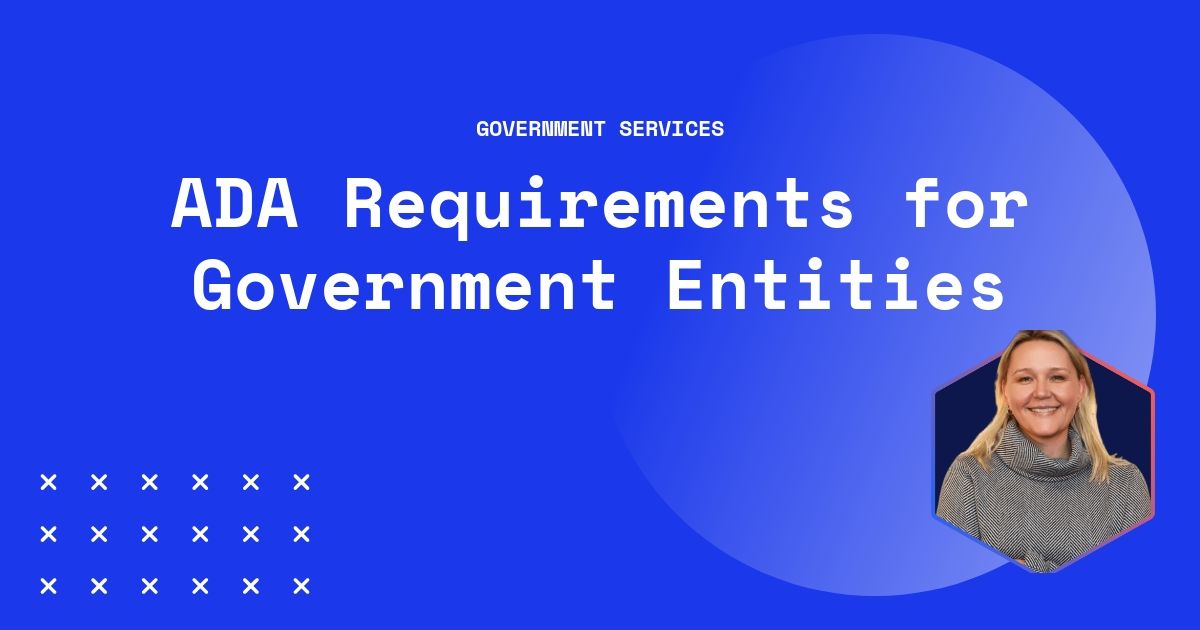Accessibility Requirements for Government Entities Explained

Accessibility Requirements for Government Entities Explained
As a nation, we strive to build an inclusive society where every individual, irrespective of their abilities or disabilities, has equal access to information and services. Accessibility is more than a moral obligation; it is mandated by both federal and state laws that require equal access for all, particularly for government entities. Aside from the moral obligation, it’s also just good business for all private and public entities to ensure they can serve all of their customers and constituents equally. This blog post provides a high-level overview of the legal requirements, free tools for testing accessibility, and a brief introduction into how you can become compliant. To automate and offload this process, we offer ongoing compliance testing for our government and non-government clients.
Federal Accessibility Laws
At the federal level, the two primary laws concerning accessibility are Section 508 of the Rehabilitation Act and Title II of the Americans with Disabilities Act (ADA).
-
Section 508 requires federal agencies to make their electronic and information technology accessible to people with disabilities. The law applies to all federal agencies when they develop, procure, maintain, or use electronic and information technology. The United States Access Board provides the Section 508 Standards to guide agencies in their commitment to accessibility (Source: Section508.gov).
-
Title II of the ADA extends the prohibition of discrimination on the basis of disability beyond federal agencies to include all public entities at the local (municipal) and state levels. This means that all the services, programs, or activities provided by local and state government entities must be accessible to all, including digital services (Source: ADA.gov).
DOJ Guidance for City and State Governments
On March 18th, 2022, the Department of Justice (“DOJ”) issued guidance for our state and local governments who are covered by ADA Title II and businesses open to the public (entities covered by Title III) to ensure their websites are accessible and meet ADA requirements. The DOJ references ADA Guidelines.
State Accessibility Laws
While federal laws set the foundation, some states have implemented additional accessibility legislation. For instance, in California, the Unruh Civil Rights Act and the California Disabled Persons Act (CDPA) augment the federal ADA to prohibit discrimination on the basis of disability by all business establishments in the state. The scope includes web accessibility, thereby impacting public entities’ online presence (Source: California Department of Justice).
Accessibility Testing Tools
There are several free tools available to test the accessibility of your digital services. Some of these include:
- WAVE Evaluation Tool: This tool provides visual feedback about the accessibility of your web content by injecting icons and indicators into your page (Source: WAVE).
- Axe DevTools: A set of accessibility testing tools that enable developers to test their website’s accessibility in real-time (Source: Deque).
- Google Lighthouse: An open-source, automated tool for improving the quality of web pages, which includes accessibility checks (Source: Google Lighthouse).
Steps to Compliance
To ensure your digital services are accessible, follow these steps:
- Understand the laws: Familiarize yourself with both federal and state accessibility laws.
- Perform an audit: Use the free tools mentioned above to identify areas of your website that need improvement.
- Make necessary changes: Use the results of your audit to guide your changes. This may include altering the color contrast on your website, adding alt text to images, or redesigning navigation for keyboard-only use.
- Maintain compliance: Regularly test your website to ensure ongoing compliance. Consider partnering with experts who specialize in accessibility to guide you in this process.
Accessibility compliance is not only a legal necessity but also a moral obligation to ensure equal access to information and services for all individuals. By taking the necessary steps to meet and maintain compliance, public entities can serve all constituents equally, and create a more inclusive digital environment.





